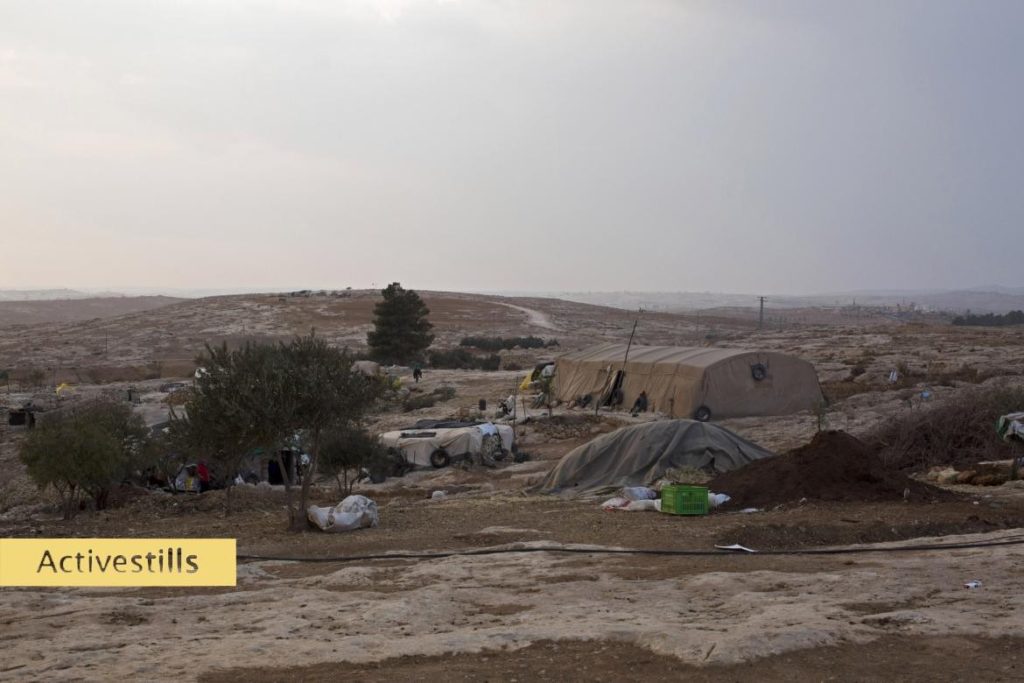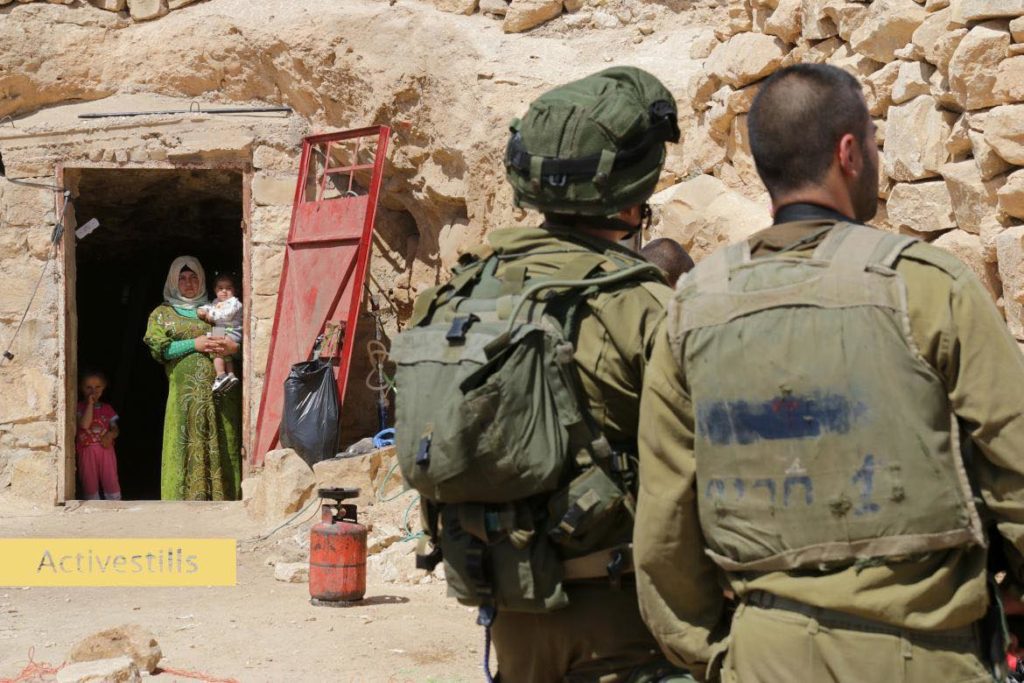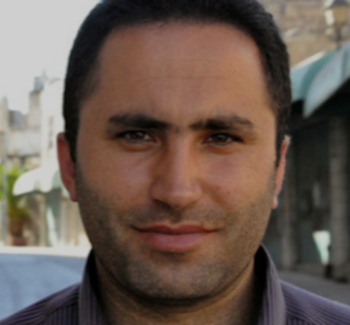Welcome to Part Four of Talking Human Rights’ special series Palestinian Gandhi on Trial with our guest, Issa Amro. If you have not yet listened to Episode One, (introducing Issa and the military occupation of the West Bank); Part Two (covering Issa’s development as a non-violent activist living under occupation); or Part Three (covering Issa’s case before an Israeli military court), you will probably want to start with those before proceeding with this episode.
In this episode, we focus on Issa’s trial before a Palestinian Authority court, where Issa stands charged with violating a controversial “Electronic Crimes Law” after writing a Facebook post criticizing the Palestinian Authority for its treatment of a journalist.
But before we talk about the case, we need to talk a bit about the Palestinian Authority — what it is, where it is, and how much power it has. It is crucial that listeners do not leave this series with any lingering ideas that the Palestinian Authority is a sovereign government, or that the Palestinians have access to the resources of a state. It is not, and they don’t.
Below you will find edited transcripts from our interview where we will discuss all this and more…
Resources/Transcripts
Where the Palestinian Authority Is, and Isn’t
Heather: In this first part of this episode, we’re going to talk a bit about a place called Area C. You may recall that we have talked about Area C a couple times already in this series. To refresh your memory, Area C accounts for the rural areas of the West Bank, which is to say most of the West Bank — over 60%.
In Area C, there is no Palestinian Authority to speak of. There, the Israeli military exerts complete control. If you are a Palestinian and you want to dig a water line, or dig a well, or make an addition onto your house, you must apply to the Israeli occupying authorities, not to the Palestinian Authority, for a permit.
This is why you see so many people in this part of the West Bank living in tents…

And in caves…

Area C is also where hundreds of thousands of Israeli settlers live, under the protection of the military.
Heather: In Part Two of this series, we talked a little bit about Issa’s activism in Area C — about his efforts to resettle villages there and to get them the resources they need… In the sections that follows, we have been talking about that, and I have asked him about an additional method I have observed used by the army multiple times to further isolate communities in Area C, that is, by blocking off village entrances and roads with huge piles of stones and debris, such that any person who wishes to leave or enter must first climb over the pile of debris. I have asked Issa if he knows anyone who lives in such isolation..
Issa: We have around 360 movement barriers in Palestine now. Movement barriers means blocks, roadblocks, closing streets, gates, earth mounds, you know, they do this it from time to time. So, we have many isolated communities especially in Area C, because they want to make their life harder and harder to force them to leave. That is the policy around it, you know, to make their life harder – no public transportation, even they need to go around to go into their village with a car. It is very costly and they don’t have schools even, especially secondary schools. So that is the case there that people live in isolation, and in segregation, alone and away from the street. The settlers, they have Route 60 open and public for them, they use it whenever they want, and the Palestinians sometimes they are not allowed to use the street.
Heather: And many [people living in Area C] don’t have running water. So you’re not just [unable to get] food into your house [because of these blocks] but you’re [unable to get] water into your house.
Issa: We don’t have running water, so Palestinians they save the water in a water tank on the roofs, wait until the water comes once every two or three weeks, sometimes in summer every month, and they don’t have enough water for showering every day. So people don’t shower every day, because they don’t like to do so, because they have a shortage of water. The other areas, you know, A and B [where the Palestinian Authority is allowed to be present], you know the Palestinian president needs a permit from Israel to move from Palestine to Jordan and even they arrested people around his house. So the army is invading Area A whenever they want, they are raiding any house in the West Bank, they destroyed a house in Area A, in Ramallah, two months ago. So the army is in control of everything in the West Bank. The army is in control of the sky, the land, underground, and the infrastructure for living so they are the ones who are really controlling all aspects of our life. In an indirect way sometimes by pressuring the Palestinian authority and also in a direct way by doing it by themselves.
More Limits on the Power of the Palestinian Authority
Heather: I want to talk more about limits on the Palestinian Authority. For instance, how much power it has to decide whether Palestinians are allowed to travel beyond the borders of the West Bank. For instance, how hard is it to get to the United States if somebody invites you?
Issa: To come to the United States is a very hard trip for the majority of the Palestinians. First, you need to apply to get a visa from the American embassy in Jerusalem. But to get into Jerusalem you need a permit from the Israeli occupation. And many, many Palestinians are blacklisted and they don’t get permits, and I am one of them. So I [haven’t gotten a permit] to go to Jerusalem for maybe ten years after being a human rights defender in Palestine. So I don’t get permits to visit Jerusalem, to visit my friends, to visit Al Aqsa mosque, or to have any kind of social relations in Jerusalem or around Jerusalem. So you are completely banned from going to Jerusalem, which is part of the West Bank, especially east Jerusalem. And the American embassy is there.
So, you apply on-line to get the visa. The process is long, but I personally am qualified to get a visa, because I got a visa many times and I have been here many times. So I applied, as everybody does, and I got a letter from the American embassy to get a permit [to Jerusalem]. The Israelis refused to give me a permit. This means that I will not be able to get a visa to come to the United States. So the Israeli military is deciding before the consulate or the embassy who comes [to the US] from the Palestinians. So, many Palestinians were not able to come here, because the occupation prevented them from going in to do the visa process in Jerusalem.
I have some friends who helped me with the American embassy, who referred me to Jordan. So I went to the American embassy in Amman to apply for a visa, and, because I have many supporters in Congress, many in human rights organizations, and much support from American friends, I managed to get my visa to come here and to do what I was planning to do from talking in conferences, to talking to senators, to Congress people in the United States.
Heather: There’s nowhere to process the visa from inside of the West Bank?
Issa: For me and for many Palestinians, you have to go to the American embassy in East Jerusalem, which is part of the West Bank, but it is under siege. We are not allowed to go without a permit. Nobody is allowed to go to Jerusalem without a permit from the Israeli military.
Heather: And Jordan is the only border you have access to that isn’t a border with Israel, right? There isn’t another way to get out of the West Bank, right?
Issa: For me, as a person in the West Bank, it’s either to travel from Ben Gurion airport in Tel Aviv, and I’m not allowed as a Palestinian human rights defender, and the majority of the Palestinians need a permit, and the permits are usually given for the people who are coexisting with the occupation and accepting the occupation. Or, I can go out from Jordan and then I travel.
Heather: Have you known anyone who left through Jordan and came back through Jordan, who lives in the West Bank, and has had trouble getting home? Even though they live there?
Issa: Yes, I know many Palestinians who were arrested coming back, who were detained for a long time. I was detained for a long time, interrogated, investigated, about my activities outside Palestine. I was blocked from traveling, I was arrested at the borders, so this is why I don’t announce in advance now, so they don’t know that I am leaving for a certain purpose when I am leaving. I just announce that I am DC when I arrive here in spite that I could do much more if I prepared in advance and I announced that I am here to reach more people, to talk to more people and have more meetings.
Heather: So even the exterior borders are controlled by Israel.
Issa: Everything is controlled by the Israeli occupation. We have ninety-nine checkpoints within the West Bank and Gaza is sieged, so Israel is controlling all aspects of our life. Importing, exporting, traveling, water, electricity, all basic needs of the Palestinians are controlled by the occupation and we feel that we are in a big jail, because the occupation is decided for us without our will. We didn’t want the occupation, we didn’t vote for the occupation, but that is the reality.
The Palestinian Authority Case
Heather: In this section, we’re going to talk about the case. You will note that what we don’t discuss much in this section is the Electronic Crimes Law under which Issa stands charged. That is a law that was passed by presidential decree in July of 2017. Immediately after it was passed, the Palestinian Authority began using it to round up journalists and activists.
In some sections, the language of this law is very vague, outlawing various activities on-line that can be seen as threatening public morals and harming national unity. In other sections, the law is incredibly specific. It outlaws the use of Virtual Private Networks (VPNs) and other technologies that activists need to protect themselves. It also requires that service providers retain information for long periods of time, should the security services ask to see it. So, we’re not talking about those aspects of the law so much in this interview. Instead, we’re talking about what it was like for Issa to be arrested by his own people, to be held by his own people, and to know that even who sympathize with his cause are helpless to assist him. Helpless against the overwhelming military occupation that requires cooperation and coordination at every turn.
******
Issa: …Always when I write any kind of critical posts against the Palestinian security forces, I know that I am facing risk, but I didn’t think that post would take me to jail.
Heather: And why did you post about this situation?
Issa: I posted because I believe in democracy, I believe in human rights, and I believe that we should act against any offender regardless of their nationality or religion and regardless of our relation with them. So when the PA violates any basic human rights, I should act, and I should speak about it, tell them it is wrong. I tell the people to act to get their rights, to not give up, and to practice their freedom of expression, and freedom of opinion. As Palestinians we see that democracy and human rights is our strength, and we want to keep it and not lose it.
Heather: When you were arrested, what happened? Did they come to your house? Did you know you were getting arrested?
Issa: No, they came to my house, they didn’t find me. I went the next day and I thought that they want only to ask me some questions, but I was arrested by them and I was mistreated.
Heather: You were held for several days, right?
Issa: I was held for maybe a week.
Heather: And is this when you went on a hunger strike?
Issa: I went directly on hunger strike.
Heather: How did they react to you hunger strike?
Issa: In the first two days, they didn’t care. They thought I am a cheap target and they can do whatever they want to me. Then, after the international and local campaigns to release me, I became the main news in Palestine and maybe in some international media agencies. They just wanted to end that. They started negotiating me to stop my hunger strike.
Heather: Did they offer you something?
Issa: They offered me a lot, and if any human rights defender is listening to me now, don’t trust the authorities when you are in jail. They are the jailers, so you don’t trust them. Whatever they offer, you should refuse. You need your lawyer to make any deal. So it must be by your lawyer or by a human rights organization to make any agreement with the authorities if they arrest you. This is what I did. I didn’t give up. I didn’t listen to them. I was very stubborn and did not stop my hunger strike or even negotiate with them about my hunger strike until I got from my lawyer that I will be released.
Heather: And what is it like? I know you are arrested by Israelis all the time, but what is it like to be arrested by fellow Palestinians?
Issa: I was destroyed from the inside. My heart was broken. To be arrested and put inside of a cell in a Palestinian jail, and the majority of the questions they asked me were about my activities against the occupation. They want to know what I am doing and how I am reaching the American Congress and I am sure that through the security cooperation between the Israeli security forces and the Palestinian security forces, that they wanted that. And I am sure that my arrest was not even a Palestinian decision. It was an Israeli decision and they asked them ot arrest me or they put pressure on certain security leaders to arrest me and harass me and make my life miserable to give up my human rights passion and my struggle against the occupation. Because mainly, I’m struggling against the occupation. The majority of my activities are against the occupation.
Heather: There does seem to be a pattern. In the case of the journalist who you posted in defense of , he was arrested by the Palestinian Authority, but then the Israeli soldiers came in and destroyed and shut down his radio station. So they seemed work to together.
Issa: Yes, both of them unfortunately are doing a lot of bad work, but we can’t say that they are equal. There is a contractor and a subcontractor. The main enemy of the Palestinian people and Palestinian rights is the Israeli occupation and they are unfortunately using the Palestinian security forces to do the dirty work.
Heather: And what does your lawyer say about the case?
Issa: My attorney knows very well that [this case] is political and it’s not about the law.
In this Episode…
Heather Roberson Gaston

Talking Human Rights host and creator Heather Roberson Gaston is a writer, adviser, and educator in the field of human rights. She holds an undergraduate degree in Peace and Conflict Studies from the University of California at Berkeley; a Master’s in Human Rights from Columbia University; and a Certificate in the Advanced Study of Central and Eastern Europe from the Harriman Institute, also at Columbia University.
Heather co-authored Macedonia: What Does it Take to Stop a War? a graphic novel based on an early solo research trip to the Balkans as an undergraduate. She is now working on a narrative work exploring the many lives and deaths of the Israeli-Palestinian peace movement, for which she spent the better part of a year living and working in Israel and the West Bank.
Issa Amro

Issa Amro is a lead non-violence activist who lives and works in the city of Hebron, Palestine. Issa has championed non-violent struggle since the Second Intifada when he found his university shuttered by the occupying Israeli military. This closure prompted Issa to organize his fellow students, as well as like-minded Israelis, until the university was reopened and the students were able to return to school.
Issa has been named a top human rights defender by more organizations than we can count. He has organized his local community for the past fifteen years, and has spoken all over the world about the importance of non-violent struggle and about non-violent tactics. You can find him on Twitter where his handle is @Issaamro.
